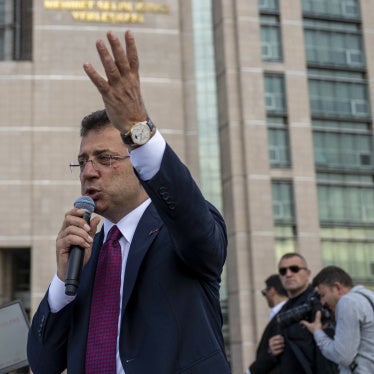The announcement on 13 May by the International Criminal Court prosecutor that she is reopening a 'preliminary examination' into alleged British war crimes in Iraq seems to have taken many in the UK by surprise. But it's less surprising to anyone who has followed the obstructive way UK authorities have handled numerous allegations of detainee abuse in Iraq.
The UK is a founder and strong supporter of the court, but is often reluctant to apply domestically the standards the UK promotes internationally. In particular, there has been no indication that the UK authorities have ever applied the basic principle of international criminal justice called command responsibility—that is, holding military and civilian commanders liable for war crimes committed by their subordinates.
In 2006, the current ICC prosecutor’s predecessor decided not to investigate cases of alleged abuses of detainees by British troops in Iraq. He said the cases appeared to be war crimes, but the numbers were not sufficient to warrant the ICC's involvement. Today, and especially since the UK forces left Iraq, hundreds more allegations have been made, by former detainees and their relatives.
The allegations were documented in a lengthy submission to the court in January by the European Center for Constitutional and Human Rights, a Berlin-based group, and Public Interest Lawyers. So it’s appropriate for the prosecutor to reopen this examination—indeed the UK would expect little else if another country were faced with such allegations.
A key issue, both for the ICC prosecutor to assess but also in terms of the UK's approach to justice, is whether the UK authorities are willing and able to conduct proper investigations into alleged war crimes up the chain of command and to prosecute all those found responsible. They should be capable—they have the resources and expertise—but in the last decade they have shown precious few signs of the will to do so. There have been hardly any prosecutions, and the latest attempt to investigate—the Iraq Historic Allegations Team—shows little sign of leading to any prosecutions. In fact, a British court ruled last year the IHAT was not structured to make decisions about prosecutions “promptly and efficiently.”
Two key problems are preventing justice, and the refusal to investigate commanders is one of them. When the UK joined the ICC it also passed the International Criminal Court Act, incorporating command responsibility into UK law. This law says that both military and civilian commanders will be criminally liable for war crimes committed by their subordinates that they knew or should have known about (for civilians 'consciously disregarded' knowledge of) and failed to take reasonable steps to prevent, or to submit the matter for criminal investigation and prosecution. This responsibility stretches up to the highest level.
The UK has a dismal record of holding senior political and military figures criminally responsible for serious crimes of their forces—it seems the last time this happened was in 1651, during the English Civil War. In fact, it seems no one even knows if the prime minister legally has command responsibility for the armed forces, as the issue has never needed to be addressed.
Command responsibility is a clearand long-standing principle of justice, though. It needs to be applied in the Iraq investigations because the alleged crimes stretched on for years without any sign of any attempt to end them. A criminal investigation should determine the full chain of command, up to the civilian leaders in ultimate charge. It should determine what the commanders knew or should have knownabout abuses of detainees, including through confidential Red Cross reports and media accounts, what they did to prevent further abuse, and if they fully cooperated with prosecutors or tried to block criminal investigations. Yet, there is no sign of any such investigation. Even in the Baha Mousa case, in which a public inquiry found that British soldiers beat a hotel receptionist to death after days of abuse in a detention centre, no commander was prosecuted under the principle of command responsibility.
Related to the reluctance to hold senior figures responsible is the lack of independence of criminal investigators and prosecutors from those they should be investigating, including the senior military and political figures. This was made clear in a key European Court of Human Rights ruling in 2011. In the ruling, Al Skeini, the court found that the investigators into alleged unlawful killings by UK forces in Iraq were within the military chain of command and thus lacked independence. Although one positive change in the last decade has been the creation of a civilian Director of Service Prosecutions, ultimate power over individual prosecutions still rests with the Attorney General, a politician and member of the government. It is hardly surprising that no politician has ever been investigated when a member of the government can block prosecutions.
In fact, the response of the Attorney General, Dominic Grieve, the person the government chose to respond to the ICC, is telling. Not only did he rightly describe himself as being in charge of the prosecutors, but he also felt the need to repeat the government's mantra that the British armed forces are “some of the best in the world.” It's difficult to reconcile such language by the person ultimately in charge of prosecutions with ensuring an independent and impartial investigationto wherever the facts lead, and with the prospect of prosecutions including up to the highest level of command.
The UK authorities have repeatedly tried to kick the allegations of abuses in Iraq into the long grass. But they will not go away until a full and independent investigation is conducted. The decision by the ICC prosecutor in The Hague should be treated by the UK authorities as a clear warning that they need to actually start applying the principles of their own International Criminal Court Act.
Clive Baldwin is a senior legal advisor at Human Rights Watch.








